Isaac Petrov's Blog: No-Bull Sci-Fi
October 16, 2021
Dreamworms #2 is out!
Hi, this is your future favorite Sci-Fi author of all times. And today is literary your Joyousday! (see what I've done there?)
Dreamworms Book 2: The Paths of Dreamtech is out in all major retailers! Yeah, I know how you feel. Here, a napkin to wipe that off.
**No Way! Tell Me More, Isaac!**
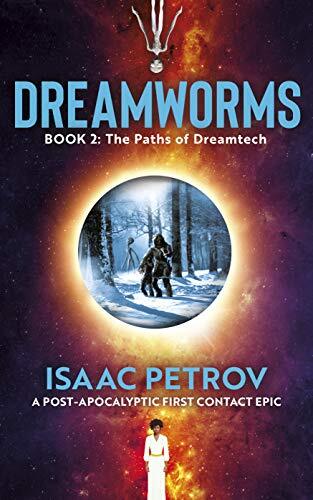
A spectacular blasphemy has been unleashed upon the world.
And the world is now turning her gaze.
AND HER FIST.
All while secretive aliens, hidden behind the barrier of dreams, meddle with whispers of hope.
All while Edda van Dolah plunges in the darkest depths of the Path of the Mind-Walkers in a desperate attempt to save her father from the ritual death known as the Joyousday.
All while Aline Speese makes a discovery that could shake awake human civilization from a centuries-old coma.
Join Ximena Epullan and her fellow students in this new episode of Professor Miyagi’s Seminar on The Rise and Fall of the Juf.
Join now, and witness humanity’s first hesitant steps into THE SECOND WAKE.
**Wow, Sounds Cool. What Else?**
Isn't that enough? Aren't you frantically looking for the purchase link already? (it's at the bottom of this blog, mensa!) Ah, if all humankind were as healthily skeptical as you are, we would be living in a much better world.
You'll find inside this piece of literary mastery not one, not two, but THREE entire episodes of aliens, post-apocalyptic goodness, Professor Miyagi, the Van Dolah lot, Ximena, Neanderthals, asteroids, dreamtech, adventure... Goah's Mercy, what else you want?! Here, some teasers:
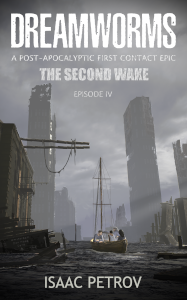
“You want to start a revolution? Here, in Lunteren? Just with… dreamy stuff?”
“Indeed, Redeemed van Dolah—What, if not dreams, is the fuel of revolutions?”
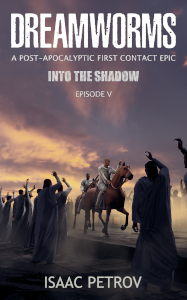
“A technology that allows the marai-ha to connect colonies spanning hundreds of light years.” Miyagi points at the alien hanging statically in midair. “This, no less, is Rew’s gift to Edda. And to humankind.”
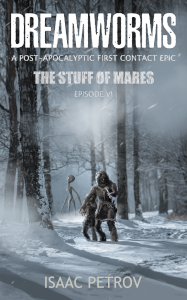
She is a historian, goahdammit! Perhaps not the most important profession to a tribe, a city, or a nation, but certainly the most important profession to a civilization destined to survive the death of the sun.
**Where in Goah's Name is that link?**
Finally! Please click here: Take me to escapist Nirvana, Isaac! Gimme Book 2!
**Looks Amazing! But, uh, I haven't read Book 1 yet...**
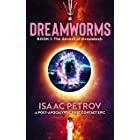
What?! Where have you been? There's a pandemic out there, you know? Did you actually have something better to do?
Ok, Ok...
*Isaac takes a deep breath*
Here. For you. Completely awesome and completely free. You're Welcome. Now, click here and go get it, mensa!
Happy out-of-this-world reading!
--Isaac Petrov
Isaac Petrov
Sci-Fi Nerd and Author
https://isaacpetrov.com
Dreamworms Book 2: The Paths of Dreamtech is out in all major retailers! Yeah, I know how you feel. Here, a napkin to wipe that off.
**No Way! Tell Me More, Isaac!**

A spectacular blasphemy has been unleashed upon the world.
And the world is now turning her gaze.
AND HER FIST.
All while secretive aliens, hidden behind the barrier of dreams, meddle with whispers of hope.
All while Edda van Dolah plunges in the darkest depths of the Path of the Mind-Walkers in a desperate attempt to save her father from the ritual death known as the Joyousday.
All while Aline Speese makes a discovery that could shake awake human civilization from a centuries-old coma.
Join Ximena Epullan and her fellow students in this new episode of Professor Miyagi’s Seminar on The Rise and Fall of the Juf.
Join now, and witness humanity’s first hesitant steps into THE SECOND WAKE.
**Wow, Sounds Cool. What Else?**
Isn't that enough? Aren't you frantically looking for the purchase link already? (it's at the bottom of this blog, mensa!) Ah, if all humankind were as healthily skeptical as you are, we would be living in a much better world.
You'll find inside this piece of literary mastery not one, not two, but THREE entire episodes of aliens, post-apocalyptic goodness, Professor Miyagi, the Van Dolah lot, Ximena, Neanderthals, asteroids, dreamtech, adventure... Goah's Mercy, what else you want?! Here, some teasers:

“You want to start a revolution? Here, in Lunteren? Just with… dreamy stuff?”
“Indeed, Redeemed van Dolah—What, if not dreams, is the fuel of revolutions?”

“A technology that allows the marai-ha to connect colonies spanning hundreds of light years.” Miyagi points at the alien hanging statically in midair. “This, no less, is Rew’s gift to Edda. And to humankind.”

She is a historian, goahdammit! Perhaps not the most important profession to a tribe, a city, or a nation, but certainly the most important profession to a civilization destined to survive the death of the sun.
**Where in Goah's Name is that link?**
Finally! Please click here: Take me to escapist Nirvana, Isaac! Gimme Book 2!
**Looks Amazing! But, uh, I haven't read Book 1 yet...**

What?! Where have you been? There's a pandemic out there, you know? Did you actually have something better to do?
Ok, Ok...
*Isaac takes a deep breath*
Here. For you. Completely awesome and completely free. You're Welcome. Now, click here and go get it, mensa!
Happy out-of-this-world reading!
--Isaac Petrov
Isaac Petrov
Sci-Fi Nerd and Author
https://isaacpetrov.com
Published on October 16, 2021 01:28
•
Tags:
isaac-petrov-dreamworms
September 30, 2021
Giving away the Top 10 SciFi of all time!
Yeah, here you can enter: https://kingsumo.com/g/uo96lr/enter-t...?
--Isaac
--Isaac
Published on September 30, 2021 05:15
September 3, 2021
Nazis and other Dark Thoughts
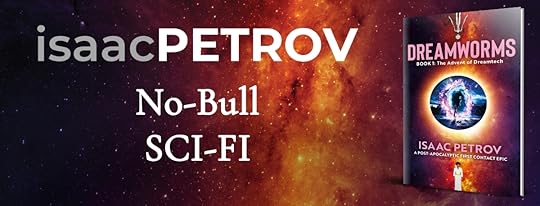
Welcome to September! And welcome back to my regular first-Friday of the month random burst of words.
This month I wanted to share with you a thought. One of those dark ones that stays with you. I can’t shake it off, and it tastes awful. Perhaps by exploring it with you now, I can put it to rest. Or perhaps you’ll reply a few lines with your (hopefully) much more optimistic perspective, which I will duly buy to sleep better.
I need to be brief. Next month is the release of Book 2 of DREAMWORMS (What?! You haven’t read book 1 yet and need a copy? It is only 99c on Amazon right now, or just ask nicely at author@isaacpetrov.com for a free copy), so you can imagine how busy I am. A big THANK YOU to my beta-readers (many are still hard at work, deadline looming)! Love you! Thanks to your feedback, the story (which was amaaaazingly good already) is coming out even better (and here I was thinking that was utterly impossible!) :D
Where was I? Ah, yes. The other day I was walking down the street, thinking about history, technology and the atomic bomb (yeah, I like to think big). As I was thinking about all this, I could almost imagine myself walking side by side with Professor Miyagi himself (a history ninja of the twenty-sixth century, in case you haven’t read book 1 yet), bouncing my thoughts against his mighty intellect. And… You know what? Let’s do just that!
A MICROSTORY
Isaac turns his baffled eyes at the sudden apparition next to him on the sidewalk, and says, “Oh, wow. Thanks so much for magically showing up, Professor Miyagi. It is a real honor.”
“Please, Isaac,” he chuckles politely. “Call me Kenji. It’s quite the pleasure to meet the guy that created my world—and myself. But don’t let that go to your head!” He says, wagging a warning finger at Isaac.
“No worries, Kenji. You know me. I’m quite the humble type—for a god. Anyway, perhaps you can help me out here.”
“Tell me.” He wets his lips in patient pose.
“Okay. World War Two. Imagine the Nazis beat the Americans to the atomic bomb.”
“Oh, Goah.”
“Exactly my thoughts. That would have been ended the war, right?”
“Of course. That’s actually what happened in the Pacific. After the atomic bomb, an all-out war stops making sense.”
“Okay, but bear with me for a minute here. Imagine the Nazis had made two bombs, all right? Just like the US had at the beginning. What would—?”
“Bye London. Bye Moscow. Or smaller cities first, to scare them shitless, like in Japan.”
“I said, bear with me, please, Kenji. Okay. So I guess the Soviets and the Brits surrender unconditionally. The US signs an armistice with the Third Reich and returns to its hemisphere.”
“There’s still Japan.”
“Ah, hmm. Let’s keep this simple, all right? Let’s say the Nazis force the US to get out of Asia as well. Japan keeps its Empire. With the collapse of the Soviet Union, communism collapse. Now, how would the world look like afterwards, you think?”
Miyagi laughs, shaking his head, like that was a joke. “Cold war, of course. After the development of the atomic Bomb, wars can only be served cold. Eurasia would be solid fascist. The US an isolationist democracy. A bleak world.”
“I assume the US would quickly follow up suit with its own nuclear arsenal, like the Soviet Union did in our own timeline.”
“Of course—and not only the US.”
“Exactly!” Isaac snaps his fingers at Miyagi. “That’s exactly what I was thinking about! It’s like you can almost read my mind, Kenji. It would be a very different world than today. And not just because we swap a type of dictatorship for another. I think the key difference between both worlds is the lessons that history would extract from their respective world wars.”
“The lessons of history… Hmm… You managed to intrigue me, Isaac. And that isn’t easy.”
“Thanks. You see, in our timeline, the Third Reich was destroyed by a multilateral alliance of ideologically opposed powers. The lesson? Collaboration is power.”
“Okay? And in the timeline with the Nazi bombs, the lesson is…?”
“A few, namely,” Isaac pulls up his thumb, “might makes right.” He raises his index, “Victory is absolute, as is defeat.” Another finger goes up. “And whoever develops the next badass apocalyptic weapon and doesn’t hesitate to use it, stays in the game.”
Miyagi whistles loudly. “Not the most stable of worlds… I wouldn’t give it a decade! Two max.”
“That’s my train of thoughts as well,” Isaac purses his lips, his extremely handsome face contracted in concern.
“Okay!” Miyagi smiles. “That was a fun exercise of alternative history. Now, if you excuse me, I have this awesome piece of literature I have to return to.”
“Wait! I need your opinion as a professional historian.”
“All right?” Miyagi smiles politely.
“Could that have happened?”
“What?”
“Could the Nazis have developed the bomb before the Americans?”
Miyagi shrugs. “Sure. They certainly had the capability.”
“So there is no—I don’t know how to put this in words—invisible forces of history that inevitably lead humanity down a stream of ever greater progress and community? Where good eventually prevails over evil? Where we learn to live together in peace without destroying our planet, or ourselves?”
“No.” Miyagi blinks. “Anything else?”
“Uh, thanks. I don’t think so. Bye, I guess.”
“Take care.” Miyagi says, and pops out of existence.
Isaac bites his lower lip and turns a worried gaze at the camera.
WHAT AM I READING?
Let me open up my kindle and get the names (I never remember them!). Okay, so I just read “Stories of your life and Others”, by Ted Chiang. A set of short stories, sci-fi-ish. And they’re good! The imagination and consistency are fantastic. I’m also half-way through “Awaken Online”, by Travis Bagwekk, the first book I ever read on the new Sci-Fi genre known as “lit-rpg” (I guess literature role playing games?). Whatever. Since I like role playing games, I thought I would give it a shot. And I’m actually enjoying it!
What am I working on?
Giving the last touches to Book 2, coming up next month. Thanks again, beta-readers!
As teaser, here are the covers of the three episodes that are part of book 2. Yeah, I know, you want it now! I can feel your thirst, your craving. But, just a month! Be patient, my friend. :)
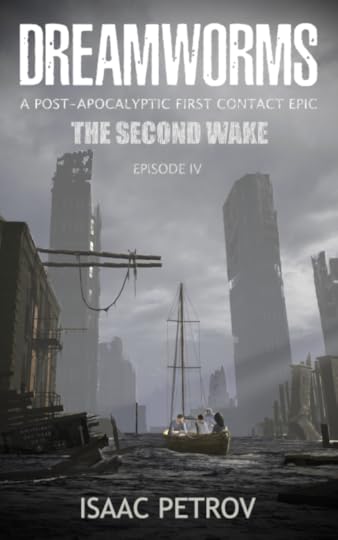
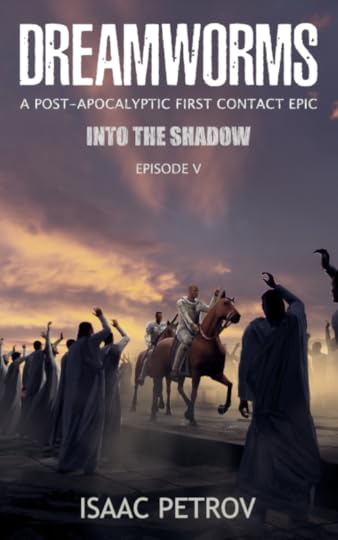
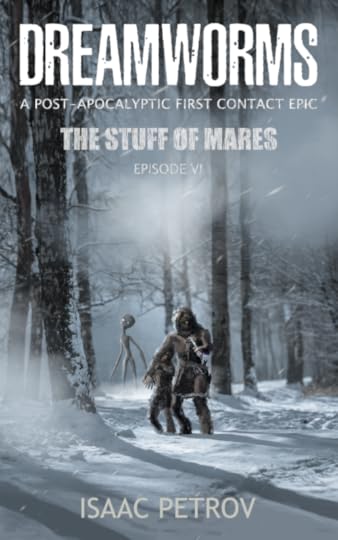
Happy out-of-this-world reading!
—Isaac, logging out
Published on September 03, 2021 08:08
August 6, 2021
What Defines Genre?

Greetings from Celtic Spain! I am on holidays, people! More than that, I am abroad! Woo hoo! Yes, for the first time in two years, I am farther than 30 km from home. So exciting! Here is a picture I made an hour ago on my morning walk. I thought I would share it. It is inspiring, isn’t it? I bet it inspires each of you in a different way. To me, it immediately reminded me of the Eye of Goah, Censor Smith and Gran Inquisitor Archer Rhodes. I’d be happy to hear what it brings to your mind? (comment away!)
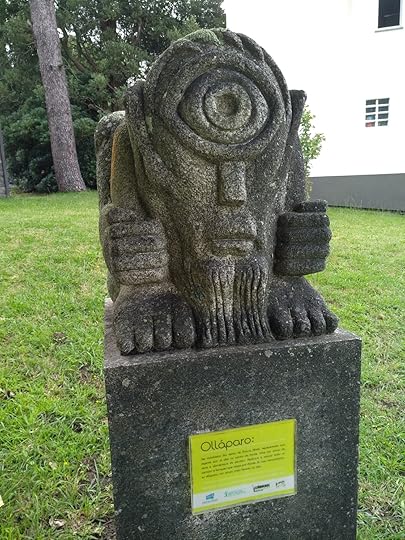
Okay, before lunch (A tortilla de patatas awaits my ravenous son, nephews, wife and humble self in an hour, so I must hurry!), and since it is already the first Friday of the month, I wanted to shoot you a newsletter, before you forget your future favorite writer of all times. ;)
I thought I would write about something I was confronted with when I started writing Dreamworms (you haven’t read it yet? What are you waiting for? ). You see, so far, as I bet most of you, I just read books of different genres that interest me. Most notably, science fiction and, to a lesser degree, fantasy. You know, good, escapist literature. But when you write a story you love, like I did (and still am doing, second book progressing well, thank you very much), sometimes the genre it belongs to is not so obvious.
But that is a HUGE problem! An author (a publisher to be more exact) must establish the genre firmly, because otherwise the story will fail to sell (translation: no readers!). When I say Dreamworms is science fiction, I am aiming at a specific typology of readers (similar to myself actually) that have specific expectations, a tad different from even its cousin genre, fantasy.
But then, Dreamworms has some story elements that quite frankly belong in the fantasy corner. Sometimes I describe it to friends like a science fiction story with a touch of fantasy. Science fantasy? Some ask. No! Science fantasy (yet another subgenre, if you haven’t yet heard of it) is a totally different beast, wizards in space and such. Not at all Dreamworms.
This problem about categorizing a book got me thinking. What defines genre? What makes a story a romance, a thriller, a mystery, a fantasy? Well, I thought, science fiction and fantasy are clearly stories on “other” worlds—fantasies indeed—with no regard to reality. Was that the answer? And if so, what separates fantasy from science fiction? Is it that fantasy happens in medieval worlds? No, there is urban fantasy, very popular nowadays, which happens “beneath” the surface of our everyday world. Is it that science fiction happens in the future? Nope. Time travel, for example, might quite literally be the opposite. Is it that science fiction has a space-travel element to it? Most definitely not. Once again, time travel comes to mind. What if science fiction has a “science” component front and foremost? A semblance of reality linked to the known laws of physics? Hah! Faster than light travel, anyone? It’s total bollocks—any scientist will tell you. And… You guessed it: time travel! Well, what if time travel is fantasy, not science fiction? Wow, interesting out-of-the-box thinking right there, man! Sadly, it is not so simple. A reader of fantasy would never fall for that. And there are other exceptions. Always exceptions.
What is it then?! What makes a science fiction story different from a fantasy story? And from other forms of story?
I don’t pretend to have a definitive answer. But I have a simple theory. Let me illustrate it with
A Microstory
As the dragon’s fiery breath thrust towards him, Godrick Trollslayer leaps in a desperate roll behind the Stone of Rohm. As the magic fire touches the ancient structure, it appears to wake it up. The annals of the bards never spoke of such an event. The Stone of Rohm was supposed to be a dead ruin of a long-gone dwarven civilization. Or was that crazy prophecy right after all? The Stone begins to glow arcane energies, dissipating the dragon’s attack like it were made of smoke. Tendrils of light and magic pick Godrick up in the air, and surround him in an aura of arcane protection.
Okay, now let’s play with that a bit, and change a thing here or there, all right? Here you go:
As the alien laser beam blasts towards him, Flint Trond leaps in a desperate roll behind the Artifact of Rohm Prime. As the photonic outburst touches the ancient structure, it appears to wake it up. The archives of the Tendarii never spoke of such an event. The Artifact of Rohm was supposed to be a dead piece of technology of a long-gone alien race. Or was that crazy AI machine right after all? The Artifact begins to glow primal energies, dissipating the alien’s attack like it were made of vacuum. An invisible force field picks Flint up in the air, and surrounds him in a cocoon of protection.
There. See what I mean? It’s the same story! Same plot. Same character archetype. So what is it then that makes the difference? Is is the setting? Most certainly, that plays a role, I believe. Is it the tropes? I very much think so! After some reflection, I tend to believe that tropes are the key ingredient of genre. If you have dragons, magic and prophecies in a story, it is fantasy (doesn’t matter if in a medieval setting, in a modern metropolis, or in a dystopian future). That’s what readers in that genre expect and love. If you have aliens, futuristic weapons, crazy AIs and force fields, well, that’s what a science fiction lover expects to read about. Oh, and time travel is one of those tropes too!
As usual, feel free to reply with your thoughts. Perhaps I’m missing something?
What am I reading?
Since I am now on holidays, Goah be Merciful, I finally got back to reading “The Carpet Makers” by Andreas Eschbach. I read very slowly, because my free time is also in heavy competition with the revision of the Dreamworms audiobook, and the German translation, of which as of this same morning there is a finished first draft. But I still need to review it—and reviewing a translation is HORRIBLE. You need to compare paragraph with paragraph and make annotations. Incredibly time consuming. Not looking forward to that, I admit. Too lazy.
What are you reading?
Here are some recommendations that some of you shared with me by email. Please note that they are not their favorite books, but just some more recent books they enjoyed.
Mick loves the M.D Cooper's series (he recommends starting with the first book of the Intrepid saga). Both Chick J. and Beverley R. Recommends the Old Man's War series by John Scalzi (I read it myself, loved it!). Shawn B.’s suggestion are the Murderbot series by Martha Wells. Chris N.’s are a John Varley trilogy: Titan, Wizard and Demon. Sofokleus S. recommends Stephen King’s Dark Tower. Ken D. suggests the Forgotten Engineer, by T S Paul. Colleen M. J. recommends Altered Carbon by Richard K. Morgan.
Andrew M. recommends A World In Time by Larry Niven specifically for someone who has never read science fiction before. Thanks, Andrew!
Feel free to comment with your current/recent readings, but ONLY if you are really enjoying it, please! I want to share only decent recommendations.
What am I working on?
I am nearing the end of Dreamworms Episode V “Into the Shadow”. Episode VI (with which Book 2 is finally complete) is already drafted, so I hope it will not take as long as the previous two.
I’m also reviewing the audiobook chapters of book 1. It is actually an amazing experience. The narrator (Corinne Davies) is sooo good. She really brings Dreamworms to life. Absolutely fantastic, I am so excited. I still have no idea how to market it though. Oh, well. Step by step. :)
I want to leave a teaser, as usual. Let me browse some recent stuff… Hmm… Ah! This, for instance. It is from a chapter named “Barbarian” at the end of Episode V (unedited, so remain tolerant of typos, etc):
“Look, Mom,” the little boy in the pale blue eyes says, holding up a clam. Barefooted, and wrapped in little more than dirty layers of plastic and thick leaves, he is very young—cannot be older than five—and his accent is so strong, that Ximena needs a moment to realize that his words are indeed English. A very old English. “This one good?”
The young woman—she can’t be older than Edda, Ximena thinks—takes it and inspects it. “No, darling, too small,” she replies, and smiles at the boy encouragingly. “But keep at it!” Her clothing is not much of an improvement over the boy’s, although Ximena thinks there are rags of pelts in the mix, but so old and worn as to deem them almost unrecognizable.
“Arch!” another boy calls while running towards the little boy across the hard wet ground of the low tide. He is taller—larger—but not older. “Look what I found, Arch!” He raises a large, red crab in his hand, skillfully held between two fingers.
The rest of the tribe—a group of a couple dozen people—grace the beach in relaxed chatter while recollecting sea delicacies from the sands in a leisure pace. Ximena watches the group with the fascination of a paleontologist studying a lost stone-age tribe. They are all so young, she thinks. The oldest cannot be much older than twenty. And—Ximena smiles at the realization—they all have that thin blue tattoo running down their left cheeks like a chain of tears.
But this is not the stone age.
Enormous buildings—structures lost in time—raise like long-dead Goliaths behind them, around them, across the shallow sea, and even beyond the opposite shore, three miles away. Ximena gapes at the maze of brick, concrete and metal that spread in all directions as far as the eyes can see.
Nature—life—has taken over long ago. No wall is free of ivies, nor roof of seagulls, nor shadow of moss. And ancient oaks, sycamores and birches grow tall and proud between the buildings.
A tall, spiked clock tower emerging from the waters right between both shores catches Ximena’s attention, as does the gigantic Gothic-style complex to which it is attached. Although distorted by the merciless decay of time, she recognizes the place at once.
That’s all I have for you today. Happy out-of-this-world reading!
—Isaac, logging out
P.S. You can subscribe to my newsletter here.
P.S. In a few days, I am going to send a call for Betas for Book 2, in case anybody is interested. What is a Beta? A reader that gets access to the raw draft and gives feedback with which the author reshapes the final version. It is as much work as pleasure, let me warn you, but a Beta influences strongly the final work. Interested? Subscribe to my newsletter here.
Published on August 06, 2021 09:02
•
Tags:
genre-dreamworms-scifi-fantasy
July 12, 2021
Context and Ducks
A Microstory
I was cycling the kids to school the other day, and as we were passing along the local hospital, I witnessed the scene that inspired this microstory.
A duck—a large, male one—leaps across the road in a frenzy. Brakes screech and horns blare. Mr. Duck makes it to the hospital on the other side, leaps to the ledge of a low window, and begins to hammer the glass with his beak, startling the nurses inside.
How do you feel about this story? I bet you are not interested. Where to begin? The most important stuff is obviously missing. Where are the aliens, the laser blasts, all the good stuff? At most you might feel mildly curious about Mr. Duck.
A nurse approaches the window—“What do you have, little guy?”—and puts her hand against the glass, but the gesture only appears to accelerate Mr. Duck’s beak rampage.
That’s the question, right? What’s up with him? Well, I will not tell you. I will not even show you (as good authors are meant to). No, I’m going to do something else. I am merely going to provide context.
Context?
Yes, context. Sounds boring, right? That will not make this microstory any better! Well, Professor Miyagi would very much disagree with you. As he likes to tell his students, “context is everything in history.” And, yeah, he’s so right. So let’s get on with it.
I have passed next to Mr. and Mrs. Duck often on my daily commute. It was a great—a wonderful—surprise to find eight eager ducklings running behind them as spring raised her neck. They went everywhere together, like they owned the hospital grounds, making the delights of children and adults alike. And when they rested, Mr. Duck would stand proud and vigilant—a defiant gaze meeting every passing biker—while the rest of the family slept with untroubled serenity on the bike path next to the water.
One day, a screeching car seeking the urgency wing dashed across the bike lane, missing Mr. Duck by a hair’s breadth.
There you have it, “context at its best”, as Miyagi would say. You can go ahead and start reading the microstory from the beginning, and see how context alone can dramatically transform the reading experience.
Oh, and I’m sorry about the lack of aliens and so on. I think the story wouldn’t have been quite the same with them in the picture, or with laser blasts :D.
Ah, before I forget. This microstory was fiction, just food for the brain. It never happened. Truth is the ducklings are real, and still there, growing quickly and still owning the hospital grounds under the vigilant eyes of Mr. and Mrs. Duck. There you have a real-world happy end.
As usual, feel free to comment with your thoughts. And in that note, I would like to share the thoughts of a reader, Scott W., that sent me his very unique perspective to last month’s microstory (about the worth of a life). He granted me permission to share it with you, so here it is:
I've thought about the two deathbed scenarios you presented because I have experienced them. I've pondered but have no answers. I worked for a funeral home for 5 years doing removals ("taking your loved one, father, etc., into our care). Alone in a hospital room or a nursing facility room was common with family only occasionally present. Sometimes that got me a little. I rarely knew the circumstances. One time, though, the great grandmother was in a hospital bed in the living room with 15 people of all ages in attendance. Another time I was bringing a lady down from the second floor of an assisted living facility, a large step up from a nursing home. I was momentarily horrified when I saw about 20 people outside the elevator. I preferred to transport my people discreetly. The crowd each had a purple rose which they placed on top of my cover over the lady. Deeply moving. I don't know if that was their traditional goodbye or if the lady was just greatly loved. Sometimes the family present could not bear to be in the room. I was either alone or with a caregiver (a newly out-of-work caregiver, another issue to ponder). Sometimes, though, the family wanted to be right there, helping me even, or hugging and kissing their loved one (always an adult female child).
— Scott W. (6th June 2021)
If you’re reading this blog, I thank you, Scott. Wonderful—deeply human—experiences, and very thought provoking about, perhaps paradoxically, the nature of a well-lived life.
What am I reading?
I am ashamed to confess that I am still reading—a month after!—“The Carpet Makers” by Andreas Eschbach. I have a good excuse, though. In a genuine display of utter nerdiness, I bought the fifth edition of Dungeons and Dragons (there are five already! I played in my youth the first edition) and had to do some urgent reading to play with my family.
What are YOU reading?
Chris M. is reading through the “First Contact” series of Peter Cawdron. Mac (he just wrote me this same morning) is reading “Pandora’s Star” from Peter Hamilton (I read that series a while ago myself).
Andrus loved the Chris Wright's Survival trilogy: "Survival", "Fragments" and "I Am Auton".
Edo loves all Terry Pratchet, which is not SciFi, but Fantasy—but hey, nobody is perfect, right? ;)
Feel free to comment with your current/recent readings, but ONLY if you are really enjoying it, please! I want to share only decent recommendations.
What am I working on?
The toughest chapters of “The Second Wake” (Episode IV of Dreamworms) are already behind me. It was a lot of new material, but I think from now on I will progress with the revision of the rest of the book much quicker (cross fingers).
Here a teaser paragraph from one of the last chapters I worked on, late in Episode IV, called, “The Mad Hatter” (unedited, so remain tolerant of typos, etc):
And yet, as Ximena inspects Edda’s body, she quickly realizes that there’s something worse going on. Worse than wounds, no matter how nasty. There is something there, in Edda’s expression. Or rather, there is something missing . Like… this is not Edda anymore. Not the Edda she already knows so intimately. This is a broken carcass, a body without a brain, shattered by horror, by fear of death. No, not fear. Fear is a word Ximena can still comprehend. Fear is intimate, painful, an emotion that she tries to avoid, and, occasionally, face. But she knows, by staring into Edda’s eyes, that whatever Edda might be feeling now, she herself has never felt before. What does a rabbit feel in the jaws of a wolf? And what when the mauling jaws begin to shut? Ximena takes a deep breath. She is so glad that the psych-link is off!
That’s all I have for you today. Happy out-of-this-world reading!
—Isaac, logging out
https://isaacpetrov.com/sign-up/
I was cycling the kids to school the other day, and as we were passing along the local hospital, I witnessed the scene that inspired this microstory.
A duck—a large, male one—leaps across the road in a frenzy. Brakes screech and horns blare. Mr. Duck makes it to the hospital on the other side, leaps to the ledge of a low window, and begins to hammer the glass with his beak, startling the nurses inside.
How do you feel about this story? I bet you are not interested. Where to begin? The most important stuff is obviously missing. Where are the aliens, the laser blasts, all the good stuff? At most you might feel mildly curious about Mr. Duck.
A nurse approaches the window—“What do you have, little guy?”—and puts her hand against the glass, but the gesture only appears to accelerate Mr. Duck’s beak rampage.
That’s the question, right? What’s up with him? Well, I will not tell you. I will not even show you (as good authors are meant to). No, I’m going to do something else. I am merely going to provide context.
Context?
Yes, context. Sounds boring, right? That will not make this microstory any better! Well, Professor Miyagi would very much disagree with you. As he likes to tell his students, “context is everything in history.” And, yeah, he’s so right. So let’s get on with it.
I have passed next to Mr. and Mrs. Duck often on my daily commute. It was a great—a wonderful—surprise to find eight eager ducklings running behind them as spring raised her neck. They went everywhere together, like they owned the hospital grounds, making the delights of children and adults alike. And when they rested, Mr. Duck would stand proud and vigilant—a defiant gaze meeting every passing biker—while the rest of the family slept with untroubled serenity on the bike path next to the water.
One day, a screeching car seeking the urgency wing dashed across the bike lane, missing Mr. Duck by a hair’s breadth.
There you have it, “context at its best”, as Miyagi would say. You can go ahead and start reading the microstory from the beginning, and see how context alone can dramatically transform the reading experience.
Oh, and I’m sorry about the lack of aliens and so on. I think the story wouldn’t have been quite the same with them in the picture, or with laser blasts :D.
Ah, before I forget. This microstory was fiction, just food for the brain. It never happened. Truth is the ducklings are real, and still there, growing quickly and still owning the hospital grounds under the vigilant eyes of Mr. and Mrs. Duck. There you have a real-world happy end.
As usual, feel free to comment with your thoughts. And in that note, I would like to share the thoughts of a reader, Scott W., that sent me his very unique perspective to last month’s microstory (about the worth of a life). He granted me permission to share it with you, so here it is:
I've thought about the two deathbed scenarios you presented because I have experienced them. I've pondered but have no answers. I worked for a funeral home for 5 years doing removals ("taking your loved one, father, etc., into our care). Alone in a hospital room or a nursing facility room was common with family only occasionally present. Sometimes that got me a little. I rarely knew the circumstances. One time, though, the great grandmother was in a hospital bed in the living room with 15 people of all ages in attendance. Another time I was bringing a lady down from the second floor of an assisted living facility, a large step up from a nursing home. I was momentarily horrified when I saw about 20 people outside the elevator. I preferred to transport my people discreetly. The crowd each had a purple rose which they placed on top of my cover over the lady. Deeply moving. I don't know if that was their traditional goodbye or if the lady was just greatly loved. Sometimes the family present could not bear to be in the room. I was either alone or with a caregiver (a newly out-of-work caregiver, another issue to ponder). Sometimes, though, the family wanted to be right there, helping me even, or hugging and kissing their loved one (always an adult female child).
— Scott W. (6th June 2021)
If you’re reading this blog, I thank you, Scott. Wonderful—deeply human—experiences, and very thought provoking about, perhaps paradoxically, the nature of a well-lived life.
What am I reading?
I am ashamed to confess that I am still reading—a month after!—“The Carpet Makers” by Andreas Eschbach. I have a good excuse, though. In a genuine display of utter nerdiness, I bought the fifth edition of Dungeons and Dragons (there are five already! I played in my youth the first edition) and had to do some urgent reading to play with my family.
What are YOU reading?
Chris M. is reading through the “First Contact” series of Peter Cawdron. Mac (he just wrote me this same morning) is reading “Pandora’s Star” from Peter Hamilton (I read that series a while ago myself).
Andrus loved the Chris Wright's Survival trilogy: "Survival", "Fragments" and "I Am Auton".
Edo loves all Terry Pratchet, which is not SciFi, but Fantasy—but hey, nobody is perfect, right? ;)
Feel free to comment with your current/recent readings, but ONLY if you are really enjoying it, please! I want to share only decent recommendations.
What am I working on?
The toughest chapters of “The Second Wake” (Episode IV of Dreamworms) are already behind me. It was a lot of new material, but I think from now on I will progress with the revision of the rest of the book much quicker (cross fingers).
Here a teaser paragraph from one of the last chapters I worked on, late in Episode IV, called, “The Mad Hatter” (unedited, so remain tolerant of typos, etc):
And yet, as Ximena inspects Edda’s body, she quickly realizes that there’s something worse going on. Worse than wounds, no matter how nasty. There is something there, in Edda’s expression. Or rather, there is something missing . Like… this is not Edda anymore. Not the Edda she already knows so intimately. This is a broken carcass, a body without a brain, shattered by horror, by fear of death. No, not fear. Fear is a word Ximena can still comprehend. Fear is intimate, painful, an emotion that she tries to avoid, and, occasionally, face. But she knows, by staring into Edda’s eyes, that whatever Edda might be feeling now, she herself has never felt before. What does a rabbit feel in the jaws of a wolf? And what when the mauling jaws begin to shut? Ximena takes a deep breath. She is so glad that the psych-link is off!
That’s all I have for you today. Happy out-of-this-world reading!
—Isaac, logging out
https://isaacpetrov.com/sign-up/
Published on July 12, 2021 06:28
June 30, 2021
A fresh editorial review
Published on June 30, 2021 00:27
June 3, 2021
A brief thought about the worth of a life (in space!)
A Microstory
Today I want to start with a microstory. A sci-fi microstory, of course. Science fiction is what brought us together after all, right? So, here I go.
A man is on his way to the moon in a rocket.
I know, I know. What a cliché. And sexist on top if it. Why not a woman? Can’t women go to the moon? Sure, yes, I know. Sorry for my insensitive, lazy story telling. But man or woman, that’s not the point of the story. So just bear with me, all right?
So here comes a micrometeorite and plucks a hole through the hull. Decompression sirens go off, red blinking lights, the whole shebang. The man, who was resting, sits bolt upright from the sudden fright and hits his scalp with a protruding, uh, science thingy. Thick, red, spherical droplets begin to swarm in alarming abundance around his head, quickly obscuring his sight. He tries to wave the blood away with his hand, but it only makes the droplets smaller and spreads them wider. By the time he finally reaches the tiny hole and he loses consciousness.
Now, what have you felt? Probably not much, right? You were probably more concerned with what was going to happen next, the plot, than with the fate of the poor bastard. And the story sucks. So, yeah.
But, let’s make an experiment now. Say the story is not quite over, and let me add a couple more lines. Here I go.
“I don’t want to go to sleep, mommy! Not without daddy’s goodnight story!”
“Oh, okay, hon, but if NASA doesn’t relay his call in the next five minutes, you are turning the light right off, young lady.”
“Why is he taking so long?” The little girl raises her large pupils at her mother. “You think he forgot about me?”
So, what is your take now? Where would you take this microstory now? Perhaps it would be better that the man doesn’t die, right? I mean, there are actual people that love him, so that makes him somehow… valuable?
These microstories, the original and the extended version, make me think about the value of human life. How would you value it? I don’t mean in economic terms, I mean in this sense that you feel that somebody’s death is more or less of a pity, if you know where I’m coming from?
A stranger dies alone in bed, leaving no family behind. No friends visit his tomb.
You might pity him (or her, I know!), but if you truly look inside your feelings, it is his loneliness that you pity, not his life. His life is worthless.
The oldest woman on Earth, Akari Watanabe, dies at the age of 115, surrounded by her loved ones, going down several generations. This Japanese matriarch has meaningfully touched hundreds of lives in her hard, long quest through life.
Now, that woman is worthy, right? But why? She has achieved something important, but what is it? Try to put in as few words as possible, and feel free to comment with your thoughts.
What am I reading?
My bedtime reading is at this moment, The Carpet Makers. Heartily recommended by my brother while he was beta testing The Advent of Dreamtech. I finally got to it, because sadly I must spend most of my reading time with non-fiction books about marketing for authors *insert puke emoji here*. But be grateful—I am!—it is thanks to them that you can ultimately read my work.
What are YOU reading?
Terry is reading The Clockwork Chimera Series series (fantastic humor and great story line, he claims). Rob recommends “The Chronicles Of The Collapse” by Robert E Taylor, although he is frustrated that the author seems to have gone AWOL. And B. (sorry, I don’t know his/her name) fave of all times is a relatively recent novel: To Sleep in a Sea of Stars.
Feel free to comment with your current/recent readings, but ONLY if you are really enjoying it, please! I want to share only decent recommendations.
What am I working on?
I’m still heavily revising “The Second Wake” (Episode IV of Dreamworms). It’s a tough nut, because this is the episode of the entire Book 2 that more work requires, but I’m over the equator already, yeah!
Here a little random snippet copy-pasted from Chapter 29 “The Eye of Goah”, to tease your appetite (unedited, so remain tolerant!):
“I am so selfish!” Marjolein shakes her head in exaggerated regret, her wild, blonde braids shaking in the air. “I wanted our trade to flourish. Oh, Goah, I am sorry. Our steel,” she points at a few individuals dressed in fine tunics, heads down, eyes shut, nodding and mumbling. “Our fish,” she points at a broader indeterminate section of her audience. “More visitors—more merchants—more dowries. Goah, I am so selfish. Heresy was spreading in the shadows, and my arrogance made me… blind. Demons were plotting to ruin our legacy. And I was too proud to see. Too—hopeful, Goah has Mercy. I was blinded by my love, my ambition for our colony: a prosperous future, thriving under Goah’s Blessing. Alas, under my careless vigilance, evil brooded. And now our name is synonymous with blasphemy. I am so sorry, Lunteren.” Her head sinks. A tear—an honest to Goah real tear—runs down her cheek. “I failed you.”
That’s all I have for you today. Happy out-of-this-world reading!
—Isaac, logging out
https://isaacpetrov.com/sign-up/
Today I want to start with a microstory. A sci-fi microstory, of course. Science fiction is what brought us together after all, right? So, here I go.
A man is on his way to the moon in a rocket.
I know, I know. What a cliché. And sexist on top if it. Why not a woman? Can’t women go to the moon? Sure, yes, I know. Sorry for my insensitive, lazy story telling. But man or woman, that’s not the point of the story. So just bear with me, all right?
So here comes a micrometeorite and plucks a hole through the hull. Decompression sirens go off, red blinking lights, the whole shebang. The man, who was resting, sits bolt upright from the sudden fright and hits his scalp with a protruding, uh, science thingy. Thick, red, spherical droplets begin to swarm in alarming abundance around his head, quickly obscuring his sight. He tries to wave the blood away with his hand, but it only makes the droplets smaller and spreads them wider. By the time he finally reaches the tiny hole and he loses consciousness.
Now, what have you felt? Probably not much, right? You were probably more concerned with what was going to happen next, the plot, than with the fate of the poor bastard. And the story sucks. So, yeah.
But, let’s make an experiment now. Say the story is not quite over, and let me add a couple more lines. Here I go.
“I don’t want to go to sleep, mommy! Not without daddy’s goodnight story!”
“Oh, okay, hon, but if NASA doesn’t relay his call in the next five minutes, you are turning the light right off, young lady.”
“Why is he taking so long?” The little girl raises her large pupils at her mother. “You think he forgot about me?”
So, what is your take now? Where would you take this microstory now? Perhaps it would be better that the man doesn’t die, right? I mean, there are actual people that love him, so that makes him somehow… valuable?
These microstories, the original and the extended version, make me think about the value of human life. How would you value it? I don’t mean in economic terms, I mean in this sense that you feel that somebody’s death is more or less of a pity, if you know where I’m coming from?
A stranger dies alone in bed, leaving no family behind. No friends visit his tomb.
You might pity him (or her, I know!), but if you truly look inside your feelings, it is his loneliness that you pity, not his life. His life is worthless.
The oldest woman on Earth, Akari Watanabe, dies at the age of 115, surrounded by her loved ones, going down several generations. This Japanese matriarch has meaningfully touched hundreds of lives in her hard, long quest through life.
Now, that woman is worthy, right? But why? She has achieved something important, but what is it? Try to put in as few words as possible, and feel free to comment with your thoughts.
What am I reading?
My bedtime reading is at this moment, The Carpet Makers. Heartily recommended by my brother while he was beta testing The Advent of Dreamtech. I finally got to it, because sadly I must spend most of my reading time with non-fiction books about marketing for authors *insert puke emoji here*. But be grateful—I am!—it is thanks to them that you can ultimately read my work.
What are YOU reading?
Terry is reading The Clockwork Chimera Series series (fantastic humor and great story line, he claims). Rob recommends “The Chronicles Of The Collapse” by Robert E Taylor, although he is frustrated that the author seems to have gone AWOL. And B. (sorry, I don’t know his/her name) fave of all times is a relatively recent novel: To Sleep in a Sea of Stars.
Feel free to comment with your current/recent readings, but ONLY if you are really enjoying it, please! I want to share only decent recommendations.
What am I working on?
I’m still heavily revising “The Second Wake” (Episode IV of Dreamworms). It’s a tough nut, because this is the episode of the entire Book 2 that more work requires, but I’m over the equator already, yeah!
Here a little random snippet copy-pasted from Chapter 29 “The Eye of Goah”, to tease your appetite (unedited, so remain tolerant!):
“I am so selfish!” Marjolein shakes her head in exaggerated regret, her wild, blonde braids shaking in the air. “I wanted our trade to flourish. Oh, Goah, I am sorry. Our steel,” she points at a few individuals dressed in fine tunics, heads down, eyes shut, nodding and mumbling. “Our fish,” she points at a broader indeterminate section of her audience. “More visitors—more merchants—more dowries. Goah, I am so selfish. Heresy was spreading in the shadows, and my arrogance made me… blind. Demons were plotting to ruin our legacy. And I was too proud to see. Too—hopeful, Goah has Mercy. I was blinded by my love, my ambition for our colony: a prosperous future, thriving under Goah’s Blessing. Alas, under my careless vigilance, evil brooded. And now our name is synonymous with blasphemy. I am so sorry, Lunteren.” Her head sinks. A tear—an honest to Goah real tear—runs down her cheek. “I failed you.”
That’s all I have for you today. Happy out-of-this-world reading!
—Isaac, logging out
https://isaacpetrov.com/sign-up/
Published on June 03, 2021 02:36



